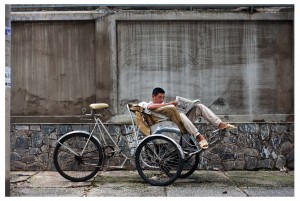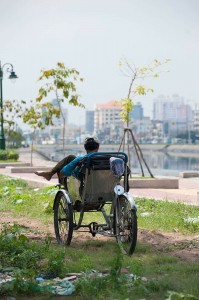 Prior to 1975 and the unification of Vietnam, Saigon had thousand – tens of thousands – of Cyclos working for private transportation firms. Once the country unified after 1975, these became trade organizations set up by the Hanoi government as cyclo cooperatives. The city’s 24 districts had around 40,000 Cyclos, including up to 5,000 in Districts 1 and 4 alone. Many families father’s and son’s shared the same Cyclo – working in shifts as a way to generate much needed income, especially post-1975 and the reunification of Vietnam.
Prior to 1975 and the unification of Vietnam, Saigon had thousand – tens of thousands – of Cyclos working for private transportation firms. Once the country unified after 1975, these became trade organizations set up by the Hanoi government as cyclo cooperatives. The city’s 24 districts had around 40,000 Cyclos, including up to 5,000 in Districts 1 and 4 alone. Many families father’s and son’s shared the same Cyclo – working in shifts as a way to generate much needed income, especially post-1975 and the reunification of Vietnam.

The father may have pedaled the Cyclo in the daytime and son in the night time – each using the Cyclo to augment their already slim wages. In the late 1980’s and just about when Vietnam implemented the beginnings of Doi Moi or ‘Renovation’- the city cooperatives broke up – part of the privatization of many industries after Doi Moi.
Saigon established a Cyclo trade organization formed in 1991 with around 900 Cyclo’s – but many remained independent in most other districts of the city. Along with these progressive changes in the city’s and country’s economic program, Vietnam’s economy grew quickly; the economy expanded at an average annual rate of 7.5% in the period between 1991-2000. Since then, a cooling economic market, domestic turbulence and again, as before, an increasingly controversial ‘situation’ with neighboring China has combined with almost unbridled growth within the city to create an environment hostile to Cyclos. A mad dash for the automobile and a traffic situation that would make most physically drained and sick if one were to commute daily as many Vietnamese still do, has made the Cyclo increasing obsolete at a time when a sustainable, cheap and readily available solution to transportation makes sense. Hanoi has already made Cyclo traffic in Saigon illegal on all major streets. Sleek, easy to maneuver and with the driver high above the passenger, affording views for both that are unobstructed – the Cyclo and it’s connection to Vietnam’s cultural history seems as likely to be on the endanger list as street-side Bia Hoi’s, Garden cafe’s and narrow alleys.



 Add to Google
Add to Google